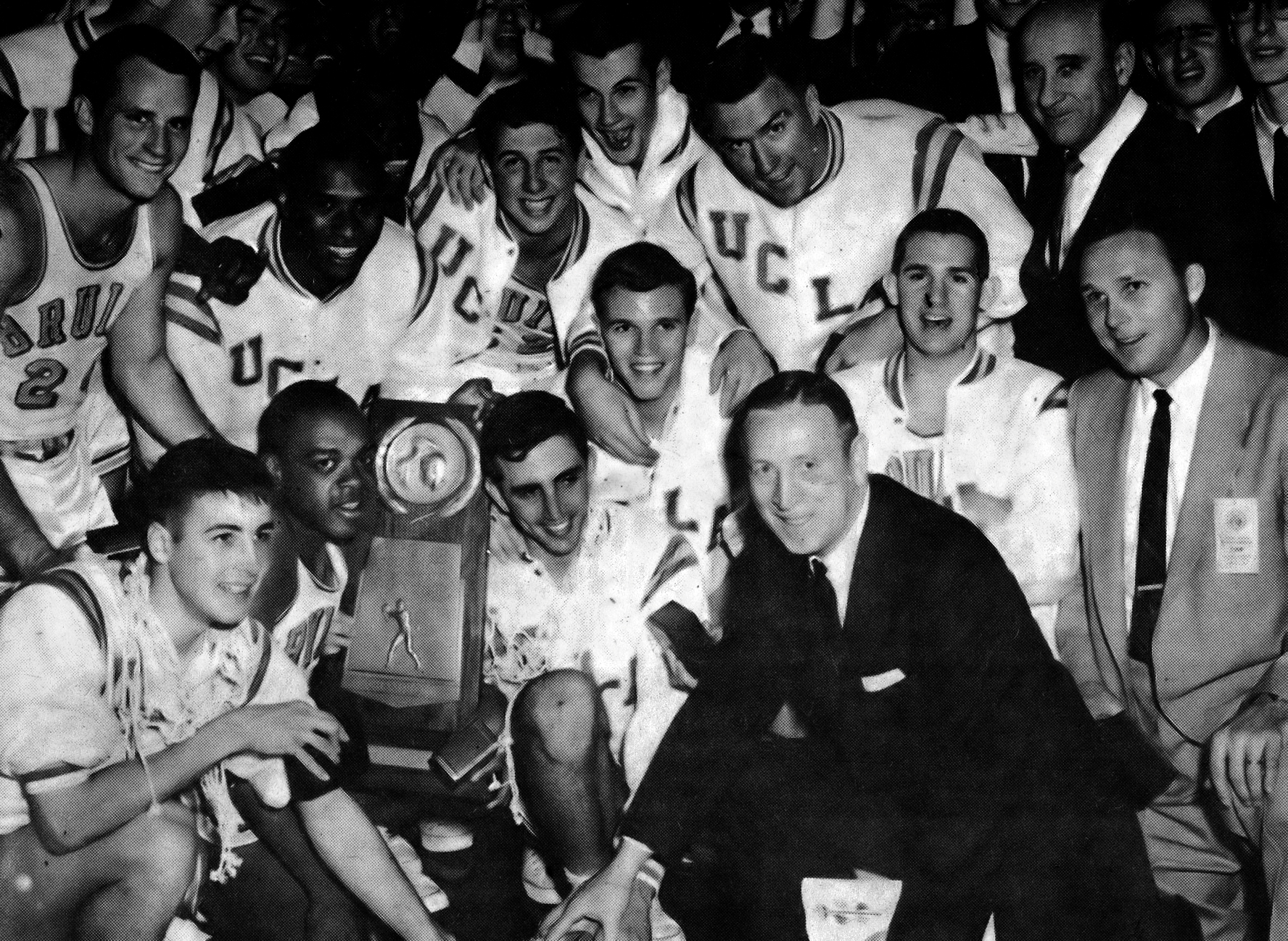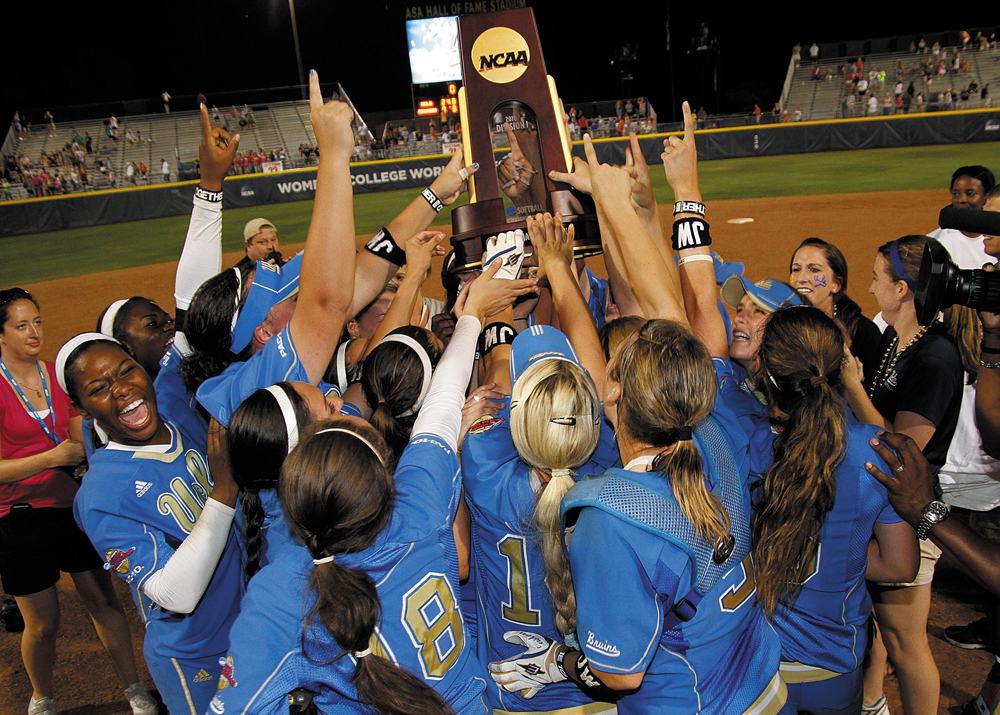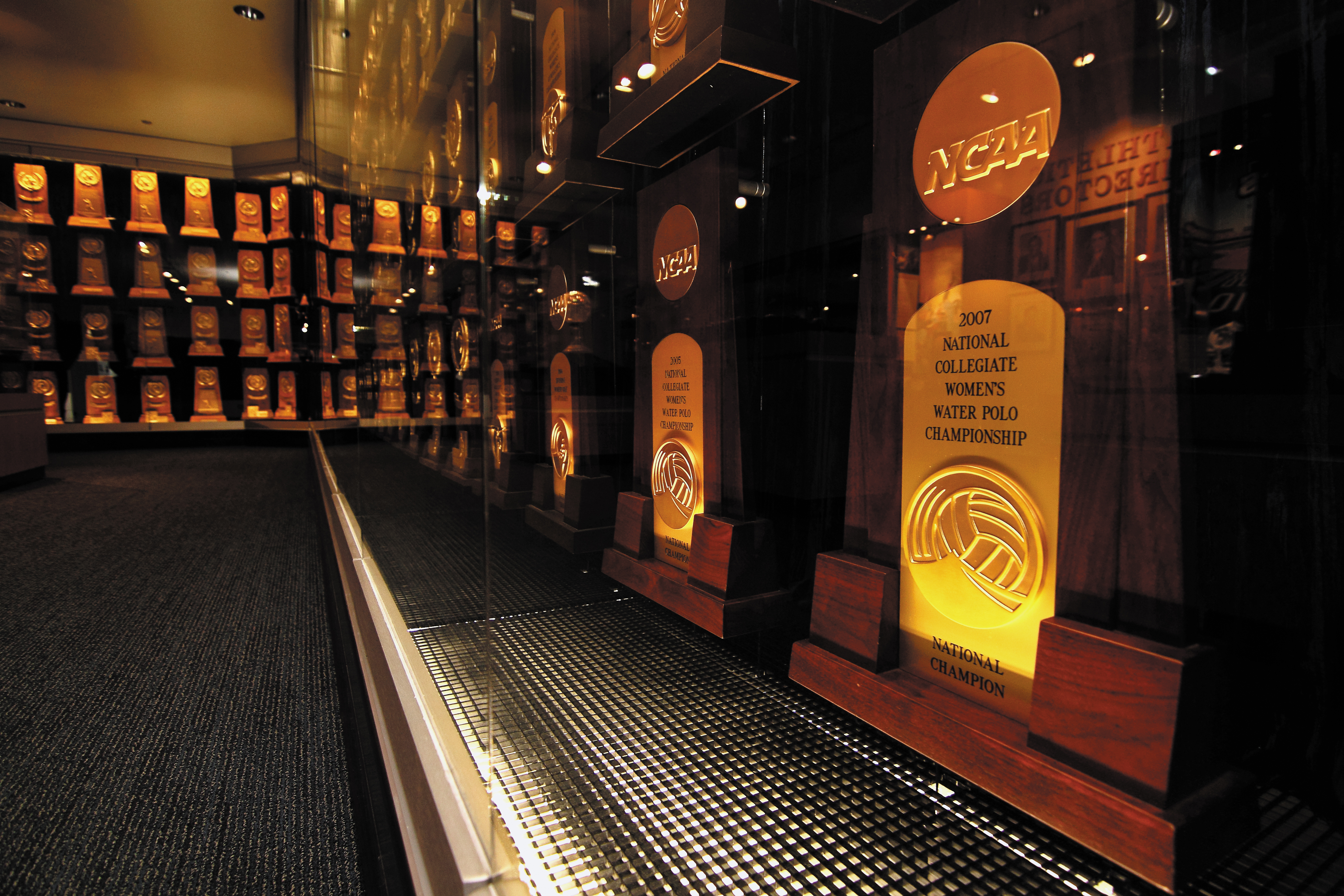
photo courtesy of UCLA athletics, Richard Clifton, Shalev Netanel

A gleaming gallery of 106 perfectly aligned trophies.
It’s the crown jewel of UCLA’s J.D. Morgan Center, a treasure chest that has left many a Division-I NCAA school mired in the bleak shadows of championship glory.
Since its inception in 1919, UCLA has won 106 NCAA team titles, seven more than runner-up Stanford, which has 99 such championships in its possession.
It is precisely this time-honored commitment to winning that has made UCLA synonymous with athletic excellence over the years, and through multiple sports.
“People at UCLA don’t get so caught up in playing not to lose,” said gymnastics coach Valorie Kondos Field. “Sometimes we do.
Sometimes you do in the classroom; you freak out. Sometimes you do on the competition floor; you get tight. But for the most part, people play to win here, and I think that’s what makes UCLA great.”
Certainly a marathon of success, the tradition dates back to 1950, when a man named William Ackerman guided UCLA to new heights.
The first one
William “Bill” Ackerman first attended UCLA in 1919, though little did he know at the time that he would be leaving behind quite the legacy. His duties as director of Associated Students UCLA aside, Ackerman enjoyed a long tenure as coach of the men’s tennis team, first joining the staff as a player-coach in 1921.
And so it was that Ackerman attempted year after year to reel in a championship trophy for 29 years to no avail. That is, until 1950 came around.
Equipped with a roster headlined by golden boy Herb Flam, Ackerman’s racket-wielding Bruins went on a tear in the coach’s final year with the team, losing just two matches all season.
Then, in the singles and doubles championships of the Texas Sectional Tournament, Flam and teammate Gene Garrett would deliver the man affectionately dubbed “Mr. A” the ultimate parting gift.
On June 24, 1950, Flam nabbed the singles title after defeating Ricard Balbiers of Rollins College in four sets, then paired with Garrett in taking down College of Pacific’s Don Hamilton and Henry Pfister to clinch the doubles title.
It was UCLA’s very first NCAA title, and it only seemed fitting that Mr. A himself would earn the honors.
1954
While Rick Neuheisel has been preoccupied lately with constructing a winning program in just his third season as coach of the UCLA football team, it is perhaps the 1954 season that still stands as the measuring stick.
For coach Red Sanders and his “Sandersmen,” there was no better way to polish off a perfect, 9-0 season than with a 34-0 thumping of USC on Nov. 20, 1954. It was a beating so thorough that it prompted USC coach Jess Hill to go on the defensive.
“They’re the best team we’ve played, but they’re not that good,” Hill said at the time, speaking of his crosstown rivals. “I don’t know the statistics, but I don’t think they drove the length of the field for a score. I’ll never admit that they’re 34 points better than we.”
After such a resounding end to the season, all that was left was for the polls to come in.
As it turned out, UCLA and Ohio State were both awarded national titles after the United Press coaches’ poll crowned the former as champions while the Associated Press poll chose the latter.
And while it wasn’t actually an NCAA title ““ the NCAA is not affiliated with championships for Division I football ”“ the 1954 hardware still goes down as one of the 127 total national titles that UCLA has won.
It also stands as UCLA football’s one and only so far.
The Wooden years
Eight years into his head coaching position with the UCLA men’s basketball program, Ben Howland has made his mark with the team he has long admired, a resume ornamented with three Pac-10 tournament titles, three Final Four appearances and a 152-54 record during that eight-year span.
Even in his childhood years, Howland took in the prowess of the Bruin hoops team from afar, often sitting in front of the television set watching the John Wooden-led teams win championship after championship during the 1960s and 1970s.
“I still remember watching that first huge game in the Astrodome with UCLA against Houston,” said Howland, referring to the Jan.
20, 1968, matchup between Houston and UCLA, the first NCAA regular-season game to be broadcast nationwide in prime time. “I used to pretend that I was Lynn Shackelford with the high-arching shot from the baseline. Even when I was a young coach, UCLA was always the mecca, the pinnacle of college coaching.”
This very program that carved out its legacy during Howland’s youth began its rise to dominance in 1964, when Wooden clinched his first title with the Bruins after guiding his team to a 98-83 win against Duke in the NCAA championship game. UCLA went on to win its second straight title in 1965 before falling into a one-year championship hiatus.
But Wooden’s Bruins would soon bounce back, reeling off seven consecutive championships from 1967 to 1973, thanks to the likes of Kareem Abdul-Jabbar, Sidney Wicks and Bill Walton, as well as the coach’s steady teachings.
After a remarkable 27 seasons, Wooden retired in 1975, but not before winning his tenth hardware with UCLA.
To this day, Howland still marvels at the wizardry that was the late Wooden’s career.
“The success was incredible; every night you watched a game, they were winning,” Howland said. “There are so many things that you try to emulate from (Wooden.) He was always focused on the process of being your very best, and that’s something that I really want to continue and try to improve upon (with the team).”
One man, 19 titles
“I remember getting thrown in the showers.”
That was the first wisp of memory that resurfaced in the mind of men’s volleyball coach Al Scates as he recalled winning his first NCAA championship as head man back in 1970.
“I remember the team picking me up in Pauley (Pavilion) and taking me to the showers, with my coat on,” said Scates, chuckling.
Then, almost in afterthought: “Yeah, we had a pretty dominating team that year.”
Dominating, indeed. Scates’ 1970 Bruins went 24-1 that season, their final victory coming after a resounding win over Long Beach State in the NCAA finals.
But for Scates, it marked only the beginning of what has been a fabled career. He guided the Bruins to three consecutive winning seasons after UCLA clinched titles again in 1971 and 1972, then repeated the feat from 1974 to 1976.
Scates’ teams ruled the volleyball scene in the 1970s and 1980s, winning seven championships in the former decade and another six in the latter.
Today, the 49th-year coach stands one shy of the 20-titles plateau, his collection of 19 trophies already solidifying his legacy.
His latest one came in 2006, a remarkable feat in and of itself considering UCLA had started out the season with a mediocre 12-12 record.
“We started out really slow (in 2006,)” Scates said. “But by the end of the year, we were so much better than everybody else that it wasn’t even close. That was one of my favorite teams because of the way the players kept fighting. They never doubted themselves, and it was just a great finish.”
And entering yet another decade into his coaching career, Scates will be looking to return UCLA volleyball to championship form.
105 & 106
As the year 2010 broke into the fold, UCLA’s NCAA title count stood at 104, a number unchanged since May 2009. Meanwhile, Kondos Field and her gymnasts were busy brewing up the ingredients for No. 105.
“Every person on the team bought into the “˜Bruin Bubble,'” Kondos Field said. “That meant we were not going to worry about opponents, scores, judges or anything else over which we did not have the direct ability to facilitate.”
After a solid 11-3 mark in the regular season, Kondos Field’s gymnasts went full steam ahead in the postseason, first clinching the team’s 15th Pac-10 title in March, then an 18th regional championship in early April before bursting onto the scene at the NCAA Championship in Gainesville, Fla.
After scoring 196.875 in the afternoon session of the preliminaries to advance into the Super Six, the Bruins simply dominated in the finals, scoring 197.725 en route to the team’s sixth NCAA title.
For Kondos Field, it was an exhilarating end to what she called a “dream season.”
“When our last girl finished her last pass on floor, our team went crazy and started sobbing and the whole bit,” she said.
“And later on that night, I had asked some of the girls, “˜Was it at that moment that you knew that we had won the championship?'”
“They looked at me and said, “˜We didn’t know if we were first or last. All we knew was that we had done what we had committed to do. We had great confidence and competed with competitive greatness.'”
“That just made me so proud that they were able to hold on to their commitment of just focusing on what they had control over.”
But if championship No. 105 was of the dreamy kind for UCLA, deja vu would strike two months later.
Then entering her fourth year at the helm, softball coach Kelly Inouye-Perez knew all about winning championships. After all, she had, prior to June, won six of them, three as a player and three as an assistant coach.
“From the very beginning, I had stated that our strength was our depth,” she said.
“And throughout the season, our depth was tested. We had some highs, we had some lows, but our vision was a strong culture, meaning the team cohesion was the focus.
“The entire year, it wasn’t about the success or the scoreboard. It was about being able to continue to compete, even after (the opposition) threw a punch.”
And respond the Bruins did.
Despite nagging injuries to key players the likes of center fielder Katie Schroeder and pitcher Megan Langenfeld, UCLA made its way to the Women’s College World Series in Oklahoma City, the grandest stage in college softball.
From that point on, the Bruins mustered up a series of performances for the ages, ultimately defeating rival Arizona in two games in the best-of-three finals of the World Series to bring home title 106.
“As a team, we were so focused and so in the moment that it was truly an experience that will last a lifetime,” Inouye-Perez said.
It was indeed a wondrous season for a team historically known as the top dog in the realm of softball. But such a standing is only a microcosm of the grandeur that is UCLA athletics.
And now, with the college year just getting under way, No. 107 awaits.
